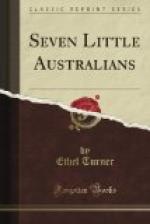Mrs. Hassal unfastened the padlock of the store-room. Such a chorus of “ohs!” and “ahs!” there was from the children!
Baby had never seen so much sugar together in her life before; she looked as if she would have liked to have been let loose in the great bin for an hour or two.
And the currants! There was a big wooden box brim full—about forty pounds, Mrs. Hassal thought when questioned.
Bunty whipped up a handful and pocketed them when everyone was looking at the mountain of candles.
“Home-made! my dear, why, yes, of course,” the old lady said. “Why, I wouldn’t dream of using a bought candle, any more than I would use bought soap.”
She showed them the great bars of yellow, clean-smelling stuff, with finer, paler-coloured for toilet purposes.
Hams and sides of bacon hung thickly from the rafters. “Those are mutton hams,” she said, pointing to one division. “I keep those for the stockmen.”
Pip wanted to know if the stores were meant to serve them all their lives, there seemed enough of them: he was astonished to hear that every six months they were replenished.
“Twenty to thirty men, counting the boundary riders and stockmen at different parts of the place; and double that number at shearing or drafting times, not to mention daily sundowners—it’s like feeding an army, my dears,” she said; “and then, you see, I had to make preparations for all of you—Bunty especially.”
Her little grey eyes twinkled merrily as she looked at that small youth.
“You can have them back,” Bunty said, half sulkily. He produced half a dozen currants from his pocket. “I shouldn’t think you’d mind, with such a lot; we only have a bottleful at home.”
On which the old lady patted his head, unlocked a tin, and filled his hands with figs and dates.
“And have you to cook every day, for all those men?” Meg said, wondering what oven could be found large enough.
“Dear, no!” the old lady answered. “Dear, dear, no; each man does everything for himself in his own hut; they don’t even get bread, only rations of flour to make damper for themselves. Then we give them a fixed, quantity of meat, tea, sugar, tobacco, candles, soap, and one or two other things.”
“Where do you keep the wool and things?” said Pip, who had a soul above home-made soap and metal dips for candles; “I can’t see any shed or anything.”
Mrs. Hassal told him they were a mile away, down by the creek, where the sheep were washed and sheared at the proper season. But the heat was too much to make even Pip want to go just then, so they attached themselves to Mr. Hassal, leaving little grandma with Esther, the General, and Baby, and went over to the brick stables near.
There were three or four buggies under cover, but no horses at all, they were farther afield. Across the paddock they went, and up the hill. Half a dozen answered Mr. Hassal’s strange whistle; the others were wild, unbroken things, that tossed their manes and fled away at the sight of people to the farthermost parts where the trees grew.




